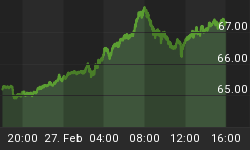The U.S. Dollar was up sharply against all major currencies as investors flocked to safer assets following a poor housing report and concerns about Greece's ability to shore up its budget deficit. More the most part, it was a quiet trade on Thursday as many big Forex players stood on the sidelines ahead of Friday's U.S. Non-Farm Payrolls Report.
The EUR USD was stable this morning after reports surfaced that investor demand was strong for the newly issued Greek 10-Year Bonds. This had the potential to be a major vote of confidence for Greece, but the euphoria was short-lived. The Euro began to fall apart after the European Central Bank left interest rates unchanged and ECB President Trichet said that growth in the Euro Zone would be uneven.
Traders fear that a slow down in the Euro Zone will hamper the ECB's ability to raise interest rates. This will lead to deflation as most countries will be forced to cut spending. In addition, the Euro may lose the interest rate differential battle if other countries such as Canada and the United States begin to withdraw stimulus and hike their benchmark interest rates. This was most likely the primary reason behind Thursday's selling pressure.
On Thursday, the Bank of England left interest rates unchanged along with its quantitative easing program. Some investors felt going into the report that the BoE would either expand or extend its asset buyback program. Nonetheless, the GBP USD sold-off mostly due to the weakness in the Euro. Other bearish factors pressuring the British Pound are the weak U.K. economy, political uncertainty and the wide budget deficit.
The USD JPY finished higher despite increased demand for lower yielding assets. Technical factors may have contributed the most to Thursday's rise after strong buying came in following a test of a major Fibonacci retracement level at 88.24. In addition, the failure to accelerate to the downside after breaking a previous swing bottom at 88.55 may have scared weaker shorts out of the market. The strong close helped form a reversal bottom which could trigger a further move to 90.14 over the near term.
The USD CHF finished sharply higher due to the weakness in the Euro. Traders once again feel that an intervention by the Swiss National Bank is imminent as it tries to protect its valuable export market.
The AUD USD closed lower after failing to hold a .618 retracement level at .9042. Increased demand for lower risk assets contributed to the weakness. Concerns over the economy and a drop in demand for higher yielding assets also pressured the NZD USD. Downside momentum has put this currency pair in a position to test the recent main bottom at .6806.
Weaker gold and crude oil prices and oversold conditions helped the USD CAD recover after almost a week long sell-off. Weak shorts covered positions over the fear that the Bank of Canada may verbally intervene at current levels. The BoC has in the past talked down the Canadian Dollar after a rapid rise over concerns that a strong currency would damage demand for Canadian exports.















